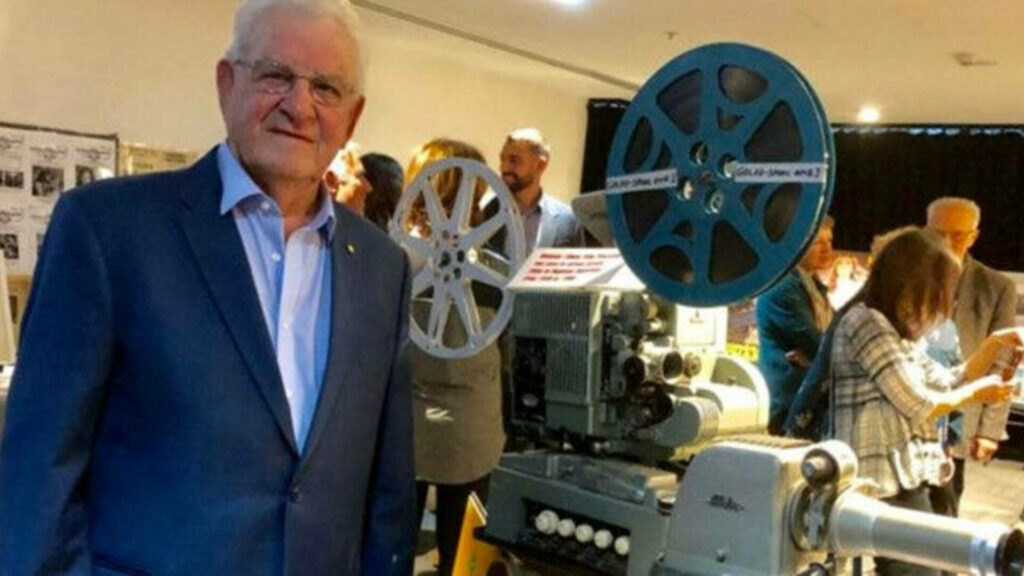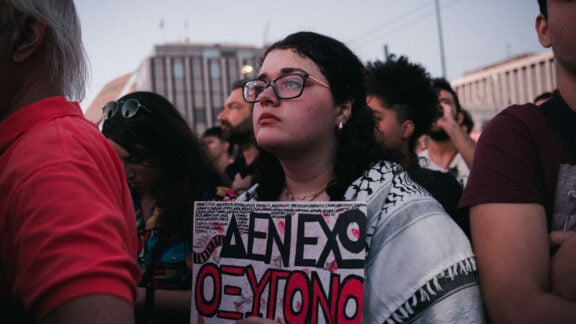The man who played a decisive role in establishing Greek cinema in Australia, who brought renowned artists like Theodorakis, Marinella, and Voskopoulos to the forefront, and who dedicated his life to advocating for Cyprus, has passed away.
Australian Hellenism mourns the loss of this iconic figure. Our community, Cyprus, and the world of Greek art and cinema, in particular, are all the poorer for his absence.
Panayiotes Yiannoudes, a pivotal figure in Greek cinema in Australia, passed away on Tuesday at the age of 89. The sad news was confirmed to Neos Kosmos by his daughter, Marilyn Yiannoudes. “We are all in shock. We can’t believe it,” she said, speaking for a family that considered him not only a father but a guiding light.

The news of his passing came as a shock to us at Neos Kosmos as well. Recently, Panayiotes had reached out to us about completing his second book on Greek cinema and had planned to write an article for the paper. He was a frequent contributor, providing articles about Greek cinema, the artists he encountered, and issues concerning Cyprus.
Yiannoudes devoted a large part of his life to advocating for the Cypriot cause and maintained close, personal relationships with prominent figures, including President Makarios, about whom he created a historical documentary.
He also served the community in many roles: as President of the Cypriot Community of Melbourne, the Federation of Cypriot Communities (SEKA), and National President of AHEPA, among others. As a Justice of the Peace, he was active in various community initiatives.
As he often noted in Neos Kosmos, Greek cinema in Australia played an essential social and cultural role in the Greek community. For many Greek immigrants, especially newly arrived ones, weekly screenings were more than entertainment—they were gatherings that fostered enduring friendships and, in some cases, even led to marriage. Much of this was due to Yiannoudes’ dedication.

“Greek cinema was the link that connected immigrants to their homeland, language, and culture,” Yiannoudes once explained. From the early 1960s to the mid-1980s, cinemas screened Greek newsreels sent by the Greek government, which featured political, social, cultural, and sporting events. However, during the dictatorship era, audiences resisted the regime’s political propaganda, leading theatre owners to continue screenings only under pressure from diplomatic authorities, who threatened to halt Greek film exports.
In addition to this cultural impact, Yiannoudes explained that Greek cinema screenings financially supported many community organisations, both in major cities and smaller towns. Greek films were shown across Australia, Tasmania, and New Zealand—wherever Greek communities existed.
In a previous story Neos Kosmos journalist Zoe Thomaidou wrote “Some of the ‘old-timers’ know firsthand that the story of Greek cinema in Australia is fascinating in itself. Panayiotes Yiannoudes was central to establishing professional screenings of Greek films here, and his contribution was transformative.”
Born on February 2, 1935, in the village of Vouni, Limassol, Cyprus, Yiannoudes attended school in Vouni and Limassol, where he excelled academically and athletically. He immigrated to Melbourne on July 8, 1956, bringing experience from the film industry in Cyprus. Shortly after arriving, he became the representative of the Greek production company Finos Film.
In 1958, Yiannoudes co-founded Cosmopolitan Motion Pictures in Melbourne with Stathis Raftopoulos and Andreas Papadopoulos. Working alongside Christos Louis in Sydney, the team shaped Greek cinema’s presence in Australia, importing over 1,100 Greek films and numerous international productions between 1958 and 1982. Cosmopolitan Motion Pictures also published O Kinimatografikos Astir, the first Greek film magazine in Australia.
The company further organised tours in Australia for prominent Greek artists, such as Kostas Hatzichristos, Dinos Iliopoulos, Nikos Xanthopoulos, Marinella, and Mikis Theodorakis.
Beyond cinema, Yiannoudes was a highly active community figure. He received the Medal of the Order of Australia in 2013. In 2010, he published a book titled With Greek Cinema Across Australia – Behind the Screenings and Scenes, with a second book expected to be published soon.
Cosmopolitan Motion Pictures once operated 11 cinemas screening Greek films in Melbourne, Adelaide, and other regional areas during its peak in the 1970s.
He will be greatly missed by his many friends and by his extended, loving family, to whom he devoted so much of his love and energy. May he rest in peace.










